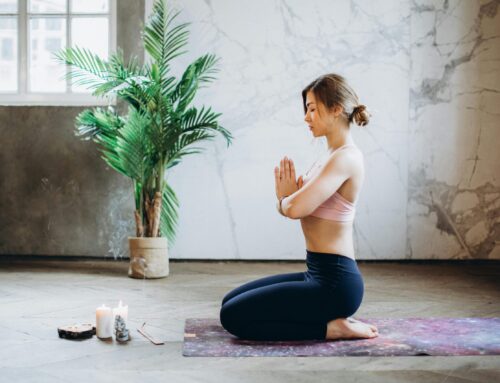Self-care is a buzzword that many businesses use to get you to buy their products claiming it’s a way to treat and pamper yourself. While spending on products for yourself can feel nice, does it count as self-care? If it doesn’t…
How do you define self-care?
The truth is self-care is more than spending money on stuff. If you think about it in the context of the way you treat others, you can’t just throw money at a relationship and expect the person to feel cared for. The same goes for you.
While self-care can be nice bath bombs and fancy dinners, it usually revolves around less glamorous activities, like taking care of your body, your emotions, and your mind.
Let’s talk about a few different types of self-care…
Types of Self-Care
Physical Self-Care
These types of self-care activities are usually the most obvious because they address your physical needs. Are you getting adequate sleep? Do you eating healthy? Are you being mindful of your alcohol consumption? Do you make sure to move your body with activities such as walking, hiking, or yoga? Make sure to take care of your body!
Emotional Self-Care
This type of self-care gets pushed aside often because it deals with those tricky emotions we like to avoid. When you get upset, do you know how to help yourself process your feelings or do you push them aside? It’s okay if you do, you are not alone! However, learning to work through your feelings is a MUST when it comes to caring for yourself. Think about it like this: when your friend or partner comes to you with upset, how do you respond? Most likely, you listen, validate, and offer support. You deserve that from yourself!
Spiritual Self-Care
These types of self-care activities tend to your higher needs. It doesn’t require believing in something religious or quasi-religious but is based on tapping into bigger themes at play through activities like meditation or gratitude practice. Spiritual self-care activities are meant to help you evolve your view of yourself and of others.
Remember: Checking in with yourself is important. You might have some unresolved emotions that desperately need to be taken care of but instead, you are addressing other self-care activities. Being honest with yourself about what needs to be taken care of is a part of self-care too.
Self-care shouldn’t be…
Seen as a reward you treat yourself to at the end of a long day (although it’s easy to fall into this pattern), but a requirement that you commit to making time for. Self-care isn’t another item on your to-do list that you HAVE to check off, it’s a way of staying connected to yourself.
Why is Self-Care Important?
Self-care is one of the most important aspects of life because it impacts your relationship with yourself and how you approach others. When you prioritize self-care, you increase your ability to navigate difficult situations with tact and self-efficacy.
Health-wise you lower your rates of anxiety and depression, you increase your happiness, and you strengthen your relationships. Sounds pretty great, right?
Making the Time for Self-Care
While you don’t want to associate self-care with another to-do task, you have to make the time for it or it won’t happen. There’s always another chore to do or another episode to watch. Blocking off time for self-care ensures that it actually happens. Remember, just like you wouldn’t bail on a date with your friend or partner, you shouldn’t bail on yourself. This time should be a non-negotiable.
You might be asking yourself what are examples of self-care?
Self-Care Ideas and Self-Care Examples
- Learn something new
- Make something with your hands
- Move your body
- Cook a meal
- Explore the outdoors
- Read (fiction or fact)
- Turn off your screens
- Journal
- Talk to someone (a therapist counts!)
- Meditate
- Take a nap
- Take a bath
- Clean your space
- Take yourself out to dinner
- Listen to music or a podcast
Don’t be afraid to try out as many things as you want! Your list can always change.
Make a Self-Care Plan
After you have tried out different activities and found ones that you enjoy, make a physical list that you can refer to for inspiration. The list can include things you want to try out in the future too!
Sometimes Self-Care Feels Easy…
When you are feeling good and life seems to be going smoothly, self-care can come easily – but what about the times when self-care feels impossible? Often, those are the times we need it the most. Writing down times where you have skimped on self-care may help you recognize patterns of times where self-care feels hard. Consider what could prevent you from taking me-time. Make a plan for those times.
Reflect
This comes back to the idea of making time for self-care. Reflecting, especially after you’ve fallen out of the habit of self-care, on what you like to do can help you reconnect with those things. While self-care can be serious in its importance with dealing with feelings, it can also be lighthearted. Taking the time to remember the activities that make you feel centered, is a part of self-care too.
Word of Caution: Be aware of activities that seem like self-care, but may not be. While unwinding in front of the TV after a long day can seem caretaking, it can also be a distraction. Self-care activities don’t always have to be checking-in, but when you are feeling down and participating in depleting activities, don’t expect to feel recharged.
Key Takeaways
- Care for yourself like you would/want to care for others.
- Tend to your emotional, physical, and spiritual self-care needs.
- Make the time for self-care.
- Try out different self-care activities until you find what fits (write it down).
- Make a self-care plan for when life gets challenging.
- Reflect on what makes you feel centered by taking the time to check in (and read your list) of activities you know make you feel good.
Self-care is an ongoing process. Be patient with yourself as you learn and relearn what you need and what makes you feel good. Self-care isn’t selfish or indulgent, it is something you deserve. So get started by asking yourself: what centers me that I want to do (or get back to doing) consistently?








